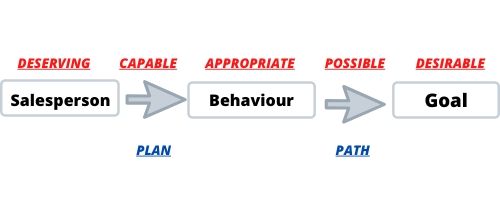Beliefs and Sales
- Home
- Persuasion Articles
- Beliefs and Sales
What have Beliefs got to do with sales?
What have Beliefs got to do with sales?
A lot.
A lot of the following article comes from a therapist named Robert Dilts but much of what he says about beliefs is applicable to sales success.
Beliefs, both empowering and limiting, are related to our expectations.
Expectation means, "to look forward to" some event or outcome.
According to Webster's dictionary it "implies a high degree of certainty to the point of making preparations or anticipating certain things, actions or feelings."
Expectations influence our behaviour in different ways, depending on where they are directed.
There are certain ideas that have an affect of expectancy attached to them.
They are of two kinds:
ideas of my doing this or that (what we call intentions) and
ideas of this or that happening to me (expectations proper).
The affect attached to them is dependent on two factors,
first on the degree of importance which the outcome has for me, and
secondly on the degree of uncertainty inherent in the expectation of the outcome.
Beliefs About Outcomes, Expectations
People's beliefs and expectations about outcomes and their own personal capabilities play an important role in their ability to achieve desired goals.
Freud's distinction between "intentions" and "expectations" refer to what are known in modern cognitive psychology (Bandura, 1982) as "self efficacy" expectation and "outcome' expectation".
Outcome expectancy is a result of a person's estimate that a given behaviour will lead to certain outcomes.
Self-efficacy expectation relates to the conviction that one can successfully execute the behaviour required to produce the desired outcome.
So, as a sales person you select a certain sales goal and start acting towards achieving that goal.

Expectations and Results
Now, how forcefully you partake in that Behaviour will depend to a large extent on your self-efficacy expectation, or whether you believe you can do it.
Similarly, your behaviour may not be optimum or be carried on for very long if you have doubts about it bringing about the desired sale.
In self-managed activities (like sales), people who are sceptical about the possibility of the outcome occurring, or about their abilities to perform, tend to undermine their own efforts when they approach their limits.
Typically, a lack of outcome expectancy leads to a feeling of 'hopelessness', which causes the person to give up out of apathy.
The absence of 'self-efficacy' expectancy, on the other hand, leads a sense of inadequacy that makes the person feel 'helplessness'.
As a friend of mine often says,
"what are your expectations when you meet a prospect because ...
"no expectations" are "expectations of "no"".
Goals and Beliefs in More Detail
When someone decides on a Goal they often formulate a Plan to achieve that Goal.
Once they start to take action on that Plan it sends them down a certain Path towards that Goal.
However, as one proceeds to enact a plan and head down a path certain beliefs will have a large bearing on attaining that outcome.
These beliefs include:
1. The desirability of the goal / outcome.
2. Confidence that the specified actions will produce the outcome.
3. The evaluation of the appropriateness and difficulty of the behaviour (regardless of whether it is believed it will produce the desired result).
4. The belief that one is capable of producing the required behaviours.
5. The sense of self worth or permission one has in relation to the required behaviours and goal / outcome.
Thus we can now diagram the beliefs connected with achieving an Goal / Outcome.

Assessing your motivation to achieve a sales goal.
Now that we have the model above we can use it to assess your motivation to achieve a sales goal.
Firstly, you need to choose a sales goal.
Write it down!
Now I want you to make the following five statements and as you do I want you to sense how you feel about their truth for you: (rate them 1 – 5 depending how strongly you believe the statement)
- "My goal is desirable and worth it"
- "It is possible for me to achieve this goal"
- "What I have to do in order to have my goal is appropriate and ecological"
- "I have the capabilities necessary to achieve my goal."
- "I have the responsibility and deserve to achieve my goal."
Ask yourself:
- Is it worth your time and energy to chase that goal?
- Can it be done?
- Is the goal ethical to you, does achieving it violate your values?
- Do you have the skills to do it?
- Do you deserve to achieve that goal?
If you do not rate yourself 4 or 5 for each of these statements it's possible that your beliefs are holding you back.
If you want to learn how to bolster the beliefs that limit you I suggest you get some sales coaching.
Until next month,Here's to YourSalesSuccess.
Click here for another article like this
- Home
- Persuasion Articles
- Beliefs and Sales